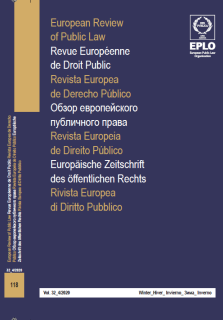
Administrative Law / Droit administratif
2019
Greece / Grèce
Doctor of Law, Law School of Athens
The chronicle outlines the development of administrative law during 2019 through important court decisions and significant laws. It starts with Law 4622/2019 which systematizes and codifies in a single piece of legislation all the provisions governing the organization, operation and transparency of the Government. It continues with Law 4604/2019 which introduces for the first time in the national legal system an independent institutional framework aimed at promoting effective gender equality, prevention and fight against gender-based violence. Furthermore, four important decisions are analyzed. The first one concerns the seizure at a third party (decision 1/2019 of the Supreme Special Court), the second one concerns the Higher Education Institutions and recruitment of salaried lawyers as defined in Article 11 of Law 1649/1986 (decision 54/2019 of the Council of State) while the third one analyzes the subject of compulsory expropriation of real estate (decision 238/2019 of the Council of State) and the last one is a pilot trial concerning the judicial clerks and pay cuts (decision 1307/2019 of the Council of State).
La chronique donne un aperçu du développement du droit administratif au cours de l’année 2019 à travers des décisions judiciaires importantes et des lois significatives. Elle commence avec la Loi 4622/2019 qui systématise et codifie dans un seul texte législatif toutes les dispositions régissant l’organisation, le fonctionnement et la transparence du Gouvernement. Elle continue avec la Loi 4604/2019 qui introduit pour la première fois dans l’ordre juridique national un cadre institutionnel indépendant visant à promouvoir efficacement l’égalité des sexes, la prévention et la lutte contre la violence sexiste. De plus, quatre décisions importantes sont analysées. La première d’entre elles concerne la saisie à un tiers (décision 1/2019 de la Cour suprême spécial), la deuxième concerne les Institutions d’enseignement supérieur et le recrutement d’avocats salariés tels que définis dans l’article 11 de la Loi 1649/1986 (décision 54/2019 du Conseil d’Etat) tandis que la troisième décision analyse le sujet de l’expropriation obligatoire des biens immobiliers (décision 238/2019 du Conseil d’Etat) et la dernière est le procès pilote concernant les greffiers judiciaires et les réductions de salaire (décision 1307/2019 du Conseil d’Etat).





















